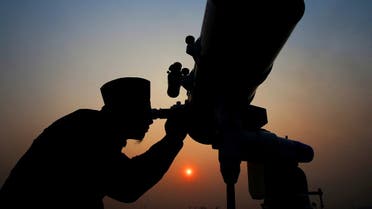Saudi Arabia, UAE announce Ramadan to begin on Thursday
The Ramadan crescent moon was not sighted in Saudi Arabia on Tuesday evening, meaning the holy month will officially begin on Thursday instead of Wednesday.


Muslims follow a lunar calendar consisting of 12 months in a year of 354 or 355 days. Sighting a crescent moon heralds the start of Ramadan, the ninth month of the Islamic calendar.
Ramadan in the United Arab Emirates (UAE) will also begin on Thursday, state press agency WAM reported on Tuesday.
The starting date of the dawn-dusk fasting month is determined by both lunar calculations and physical sightings of a new moon.
Ramadan is observed by more than 1.8 billion Muslims worldwide and is considered a month of fasting and spirituality. It is believed to be the month when the Quran was revealed to the Prophet Mohammed.
Fasting during Ramadan is one of the five pillars of Islam and is mandatory for all healthy Muslims. However, young children, sick individuals, travelers, and women who are pregnant, nursing, or menstruating are exempt.
Muslims have followed the tradition of looking for the crescent moon for thousands of years to determine the start of Ramadan as well as the two major holidays in Islam, Eid al-Fitr and Eid al-Adha.
During the month of Ramadan, adjusting to the lack of food and water during the day can leave people feeling tired and sluggish.
And while work and school hours are reduced, it can be hard to stay energized and focused throughout the day.
Here are some tips to prevent fatigue while fasting:
1. Water, water, water!
While this one may be redundant, it is important to ensure that you meet your daily water intake during Ramadan. Try to drink at least 8-10 cups of water during non-fasting hours to prevent dehydration. You can also drink fruit-infused water, fresh juice, coconut water, and herbal teas.
2. Avoid caffeine
Since Muslims cannot have anything to drink while fasting, those who may be used to enjoying their morning tea or coffee may opt to give into their caffeine cravings after Iftar. However, having too much caffeine can be very dehydrating so it is best to limit the amount of coffee, tea, or fizzy drinks you have after breaking your fast.

A woman having coffee. (Stock photo)
3. Take frequent naps
Sleep drastically impacts your energy levels. During Ramadan, when most activities take place after sunset, it is even more vital to ensure you are getting enough rest. Taking a short nap during the day can help you recharge your energy levels. A 15 or 30-minute nap is sufficient to get you through the day.
4. Eat a healthy Iftar
Breaking your fast with healthy foods like dates, fruits, and vegetables can help you maintain your energy levels. Avoid eating fried and sugary foods during Iftar as they can make you feel sluggish.
Try to have a balanced meal with protein, vegetables, and carbohydrates to leave you feeling satisfied and well nourished.

5. Avoid excessive physical activity
Strenuous physical activity while fasting may leave you feeling exhausted once you break your fast. Instead, try to take part in low-intensity exercises like walking or yoga.

